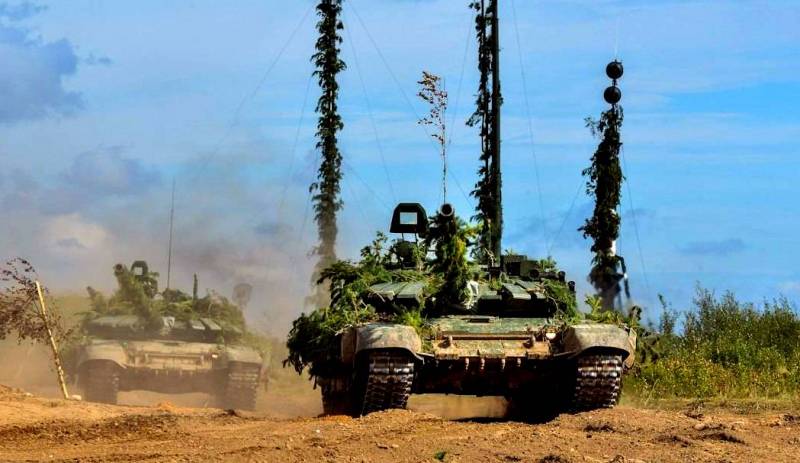NATO told why the Americans will not be able to stop the Russian troops
In recent years, large-scale military exercises have been increasingly carried out in countries of Eastern Europe. Their usual legend: a certain aggressive country possessing nuclear weapons invades the territory of young NATO members. After studying the experience of the so-called “war games”, the bloc’s analysts came to an unpleasant conclusion.
In their opinion, the American army is not able to protect Poland and the Baltic countries in case of invasion by the Armed forces of the Russian Federation. It is interesting that NATO experts initially proceeded from the presumption of aggressiveness of our country, outlining the motives of such a hypothetical invasion.
Most Eastern European countries joined the North Atlantic Alliance in 2004. Now the Americans are complaining that over all these years they did not find the time to prepare them for defense against the Russian invasion.
- complains Douglas Lute, the former representative of the United States of America to NATO.
He notes that the Russian military knows better the infrastructure of Eastern Europe than their possible opponents, since these countries were previously part of the Warsaw Pact, and since its entry into the Western military bloc its principal updates have not occurred.
In the case of the “Russian Blitzkrieg” to the Baltic States and Poland, the American forces will be primarily prevented by flimsy bridges and narrow roads. Problems with the promotion of the Polish allies to help even the advanced units. The rear units will have to go through logistical hell on hundreds of kilometers of roads in Eastern Europe. For example, the narrow road from Poland to Lithuania is easy to block, even with a broken tank, even with an inverted wagon. And if necessary, transfer equipment to the Baltic States by rail, speed will drop sharply due to the need to switch to a gauge of a different width. It is known that after the exercises in Georgia, American heavy equipment returned to bases in Germany for four months, and this is in peacetime.
NATO analysts point to European bureaucracy as a possible reason for the dangerous delay. In Sweden, it is required to notify three weeks in advance of the need to use its territory for the transfer of troops, and in Germany this is allowed to be done only at night. In the event of a full-scale war between NATO and Russia, this red tape will be abolished, but not the fact that a local conflict somewhere in the Baltic States will be promptly considered a sufficient reason.
Apparently, Washington continues to push through the idea of creating the so-called “Military Schengen” in order to prepare Europe’s infrastructure for the rapid deployment of troops, while avoiding bureaucratic delays.
In their opinion, the American army is not able to protect Poland and the Baltic countries in case of invasion by the Armed forces of the Russian Federation. It is interesting that NATO experts initially proceeded from the presumption of aggressiveness of our country, outlining the motives of such a hypothetical invasion.
Most Eastern European countries joined the North Atlantic Alliance in 2004. Now the Americans are complaining that over all these years they did not find the time to prepare them for defense against the Russian invasion.
We didn’t think that such a large force could be transferred there.
- complains Douglas Lute, the former representative of the United States of America to NATO.
He notes that the Russian military knows better the infrastructure of Eastern Europe than their possible opponents, since these countries were previously part of the Warsaw Pact, and since its entry into the Western military bloc its principal updates have not occurred.
In the case of the “Russian Blitzkrieg” to the Baltic States and Poland, the American forces will be primarily prevented by flimsy bridges and narrow roads. Problems with the promotion of the Polish allies to help even the advanced units. The rear units will have to go through logistical hell on hundreds of kilometers of roads in Eastern Europe. For example, the narrow road from Poland to Lithuania is easy to block, even with a broken tank, even with an inverted wagon. And if necessary, transfer equipment to the Baltic States by rail, speed will drop sharply due to the need to switch to a gauge of a different width. It is known that after the exercises in Georgia, American heavy equipment returned to bases in Germany for four months, and this is in peacetime.
NATO analysts point to European bureaucracy as a possible reason for the dangerous delay. In Sweden, it is required to notify three weeks in advance of the need to use its territory for the transfer of troops, and in Germany this is allowed to be done only at night. In the event of a full-scale war between NATO and Russia, this red tape will be abolished, but not the fact that a local conflict somewhere in the Baltic States will be promptly considered a sufficient reason.
Apparently, Washington continues to push through the idea of creating the so-called “Military Schengen” in order to prepare Europe’s infrastructure for the rapid deployment of troops, while avoiding bureaucratic delays.

Information